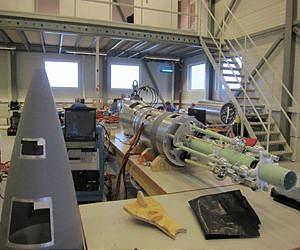Jul 28, 2016
Russia to Create New Powerful Plasma Rocket Engine
Posted by Klaus Baldauf in categories: nuclear energy, space
A Russian rocket engine company, with the assistance of a major research and development institute, will work on a project to create a powerful electrodeless plasma rocket engine, Russia’s Roscosmos space corporation said Wednesday.
The project will be developed by the Kurchatov Institute, Russia’s leading research and development institution in the field of nuclear energy, and the Chemical Automatics Design Bureau (CADB).
“The project involves the development of a new-generation electrodeless plasma engine. It is a high-power engine using fuel in a plasma state. It has a high energy efficiency, an ability to use almost any kind of rocket fuel… and its maximum engine power is limited only by the power supply of a high-frequency generator,” Roscosmos said in a statement.
Continue reading “Russia to Create New Powerful Plasma Rocket Engine” »


















